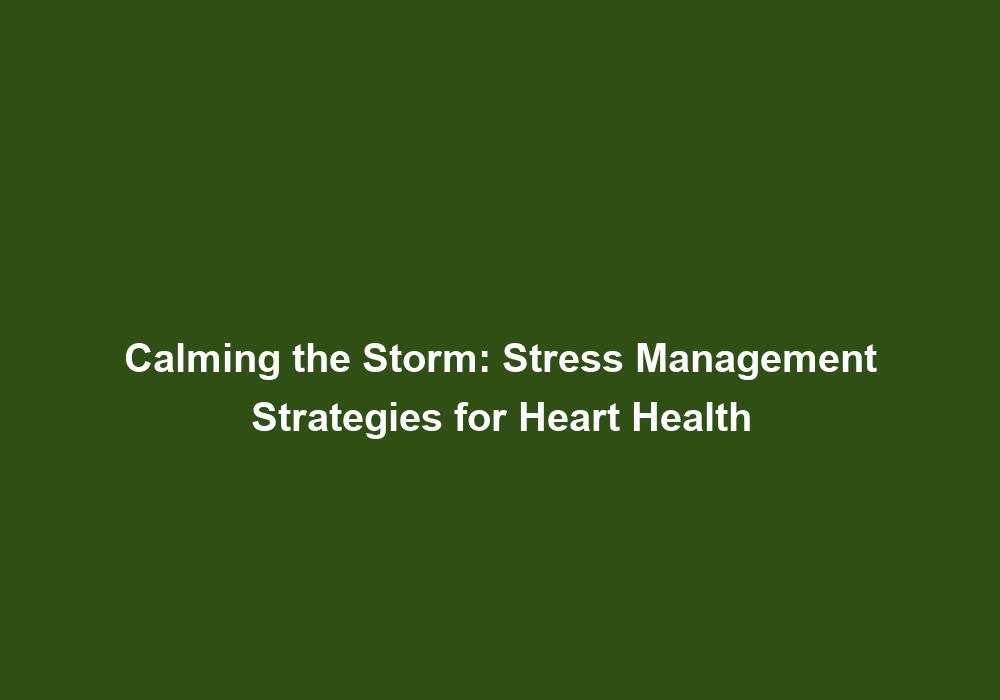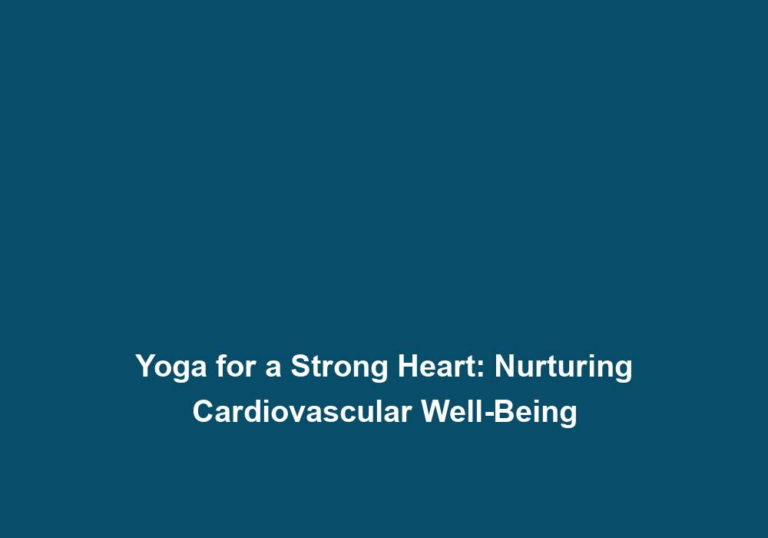Calming the Storm: Stress Management Strategies for Heart Health
Stress has become an inevitable part of our modern lifestyle, and its impact on our overall health cannot be underestimated. It is well known that stress can take a toll on our mental well-being, but what many people fail to realize is the significant effect it can have on our physical health, especially our heart health. Research has shown a strong correlation between stress and the development of cardiovascular diseases such as heart attacks and hypertension.
However, there is hope. By implementing effective stress management strategies, we can calm the storm within us and protect our heart health. In this article, we will explore various techniques and practices that can help alleviate stress and promote a healthy heart.
Recognizing the Signs of Stress
Before we dive into stress management strategies, it is crucial to understand and recognize the signs of stress. By being aware of these signs, you can take proactive steps towards managing stress and safeguarding your heart health. Here are some common symptoms of stress:
-
Increased heart rate and palpitations: Stress triggers the release of stress hormones that can lead to an elevated heart rate and palpitations. This can put strain on the heart and increase the risk of cardiovascular problems.
-
Elevated blood pressure: Chronic stress can cause long-term high blood pressure, which is a major risk factor for heart disease.
-
Difficulty sleeping or insomnia: Stress can disrupt sleep patterns, making it difficult to fall asleep or stay asleep. Lack of quality sleep can impact heart health and increase the risk of heart disease.
-
Chronic fatigue: Prolonged stress can leave you feeling constantly tired and drained, affecting your overall energy levels and well-being.
-
Irritability and mood swings: Stress can have a significant impact on your mood, leading to irritability, mood swings, and even depression. These emotional changes can further contribute to heart health problems.
-
Muscle tension and headaches: Stress can cause muscle tension, leading to headaches and body aches. Chronic tension can also contribute to the development of conditions like migraines.
-
Digestive problems: Stress can affect the digestive system, leading to issues such as stomachaches, indigestion, and even irritable bowel syndrome (IBS).
-
Decreased focus and concentration: Stress can impair cognitive function, making it difficult to concentrate, remember information, and make decisions effectively.
If you experience any of these symptoms on a regular basis, it is time to take action and prioritize stress management. Managing stress not only improves your mental well-being but also plays a crucial role in maintaining a healthy heart.
The Power of Exercise
Physical activity is not only beneficial for maintaining a healthy weight and boosting cardiovascular health but is also an excellent stress management tool. Engaging in regular exercise releases endorphins, which are natural mood boosters. Additionally, exercise helps reduce the levels of stress hormones such as cortisol in the body.
Consider incorporating the following activities into your routine:
- Aerobic exercises such as walking, jogging, or swimming: These activities increase your heart rate, improve blood circulation, and release endorphins, all of which contribute to stress reduction and heart health.
- Yoga or Pilates for a combination of physical activity and relaxation techniques: These practices not only provide a low-impact workout but also incorporate breathing exercises and mindfulness, promoting stress relief and heart health.
- Strength training to improve overall fitness and relieve stress: Building strength through resistance training not only benefits your physical health but also boosts self-confidence and improves mental well-being.
Regular exercise not only helps manage stress but also improves heart health by reducing the risk of cardiovascular diseases. Aim for at least 150 minutes of moderate-intensity aerobic activity or 75 minutes of vigorous-intensity aerobic activity per week, along with muscle-strengthening activities on two or more days.
Mindful Meditation and Breathing Exercises
Practicing mindfulness meditation and deep breathing exercises can help calm the mind and reduce stress. These techniques focus on bringing awareness to the present moment, letting go of worries, and promoting relaxation.
Here are a few simple exercises to get you started:
-
Deep Breathing: Find a quiet and comfortable space. Sit or lie down, close your eyes, and take deep, slow breaths. Inhale through your nose, allowing your abdomen to rise, and exhale through your mouth, letting go of any tension or stress. Repeat this for a few minutes, focusing solely on your breath. Deep breathing activates the body’s relaxation response, slowing down the heart rate and promoting a sense of calm.
-
Body Scan: Lie down in a comfortable position and close your eyes. Start by focusing on your toes, consciously relaxing them. Gradually move your attention up through your body, relaxing each muscle group as you go. This exercise helps release tension and promotes a sense of calm. Body scan meditation can be done as a standalone practice or as part of a larger mindfulness meditation session.
In addition to these techniques, other mindfulness practices such as guided meditation, progressive muscle relaxation, and visualization can also be helpful in managing stress and promoting heart health. Experiment with different techniques and find what works best for you.
Nurturing a Support System
Building and nurturing a strong support system is essential for managing stress and maintaining heart health. Having friends, family, or even joining support groups can provide a much-needed outlet for discussing your concerns, seeking advice, and receiving emotional support.
Consider the following steps to nurture your support system:
- Communicate openly with your loved ones about your stressors and concerns. Sharing your feelings and experiences can help alleviate stress and provide a fresh perspective.
- Seek professional help if needed. Therapists and counselors can provide guidance and support tailored to your specific needs. They can assist in developing coping mechanisms, managing stress, and improving overall well-being.
- Join community groups or organizations that share similar interests or hobbies. Connecting with like-minded individuals can help alleviate stress and foster a sense of belonging. Engaging in group activities can also provide opportunities for social support and stress relief.
Remember, you don’t have to face stress alone. Building a support system can help you navigate through challenging times, reduce stress, and improve heart health.
Prioritizing Self-Care
Self-care is crucial for overall well-being and stress management. Taking time to care for yourself not only reduces stress but also promotes heart health. Make self-care a priority by incorporating the following practices into your daily routine:
-
Quality Sleep: Aim for 7-8 hours of uninterrupted sleep each night. Create a relaxing bedtime routine, limit screen time before bed, and ensure your sleep environment is comfortable and conducive to restful sleep. Quality sleep rejuvenates the body and mind, allowing you to better cope with stress and maintain heart health.
-
Healthy Diet: Fuel your body with nutritious foods rich in vitamins, minerals, and antioxidants. Incorporate fruits, vegetables, whole grains, lean proteins, and healthy fats into your meals. Limit the consumption of processed foods, sugary snacks, and excessive caffeine. A healthy diet provides essential nutrients that support heart health and help combat the negative effects of stress.
-
Time for Hobbies: Engage in activities you enjoy, such as reading, painting, gardening, or listening to music. Hobbies provide a valuable outlet for relaxation and stress relief. They divert your attention from daily stressors, promote a sense of accomplishment, and contribute to overall well-being.
-
Time Outdoors: Spend time in nature, whether it’s taking a walk in the park or going for a hike. Connecting with nature has been shown to reduce stress levels and improve overall well-being. Being in green spaces promotes relaxation, lowers blood pressure, and enhances mood, all of which benefit heart health.
By prioritizing self-care, you are taking proactive steps towards managing stress and protecting your heart health. Remember, self-care is not selfish; it is necessary for your overall well-being.
Seeking Professional Guidance
If stress is significantly impacting your life and you are finding it difficult to manage on your own, seeking professional guidance can be immensely helpful. Mental health professionals, such as therapists or counselors, can provide specialized techniques and strategies tailored to your unique needs. They can also help you explore the underlying causes of stress and develop coping mechanisms.
Remember, managing stress is a continuous process that requires commitment and practice. By implementing these stress management strategies and prioritizing your heart health, you can calm the storm within, leading to a healthier and happier life.







